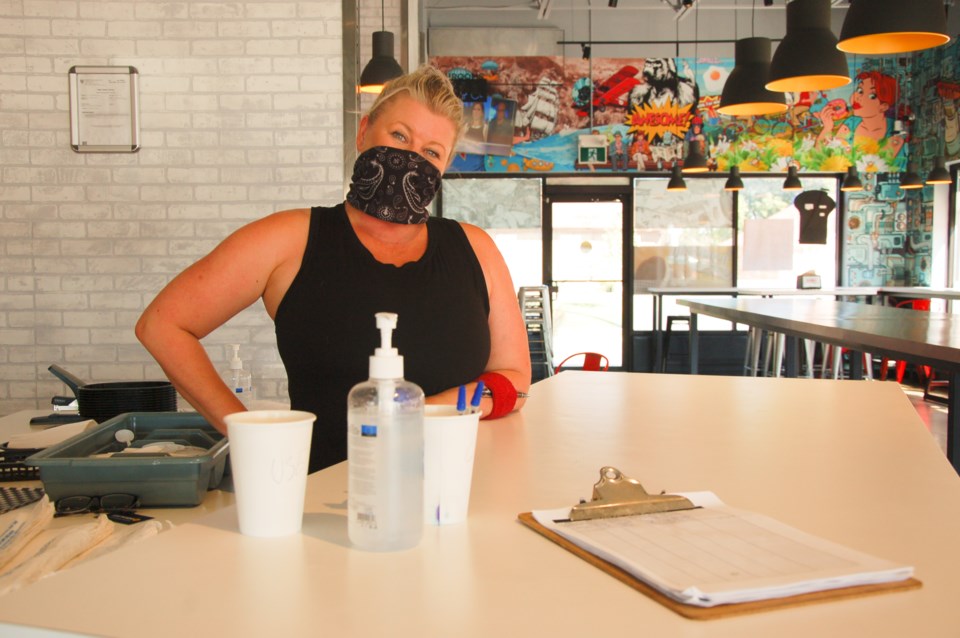If vaccine certificates are what it takes to avoid more lockdowns, then so be it, says Dana McQuatt, co-owner of Infamous Eatery. However, she worries about the increased likelihood of combative customers who oppose the provincial vaccination mandate announced Wednesday.
“I don’t know how I can expect my younger employees to ask someone who is strongly against vaccinating for their certificate and have that end in a happy, satisfied customer sort of way,” she said, acknowledging the impact on staff as well.
“You simply can’t ask your employees to be policing the doors. I’m going to need bouncers and I can barely afford the staff that I have, with all the duties that they have.”
Starting Sept. 22, proof of full vaccination will be required for indoor dining at restaurants and bars, as well as nightclubs, gyms and other fitness facilities, sporting events, casinos, bingo halls, concerts, theatres, cinemas and more – places where face coverings cannot always be worn.
A digital vaccination certificate is expected to be introduced in October.
While not pleased the onus of enforcement is on business owners, “it makes sense” to implement a province-wide vaccination certificate mandate in those settings, believes Shakiba Shayani, executive director of the Guelph Chamber of Commerce.
“It’s not an ideal position to be in, but we think that having a provincial system in place will mean higher economic growth, greater business confidence and consumer confidence, all toward a reduced risk of further lockdowns,” she said. “Those are much more detrimental toward business.”
There remain many unknowns about the certificates, Shayani points out, including how the system will work, the technology needed to use it and how the rules will be enforced.
“It is unfair and an undue hardship on businesses right now to have to figure out how to enforce this. I wish that they were not put into this position,” she said, calling for guidance and guidelines so that “businesses have the sense of security they need to make the tough decisions that are required.”
There have been several confrontations between business staff and customers in Guelph and beyond since the pandemic began, mostly regarding mandatory mask-wearing requirements. In the case of Infamous Eatery, McQuatt said there have been no major incidents but sometimes customers “get upset” about having to sign-in for contact tracing.
She and Shayani are concerned the situation will only get worse with vaccine certificates.
“Businesses are not public health officials. They are not bylaw or police officers,” she said, adding businesses are already busy “trying to manage the day to day hardship” brought on by the pandemic.
“Generally speaking, it’s a good thing,” Marty Williams, executive director of the Downtown Guelph Business Association, said of vaccine certificates. “Anything that will prevent further lockdowns is an important step.
“The writing has been on the wall for a long time. Ontario is kind of late to the party on this.”
He’s less concerned about businesses having to enforce the mandate, suggesting most restaurants and other businesses are already playing that role in terms of masking and contact tracing.
Earlier Wednesday, Dr. Matthew Tenenbaum, associate medical officer of health for Wellington-Dufferin-Guelph Public Health, issued an open letter to local employers offering the “strongest possible recommendation” that they implement vaccine policies for workers.
“This would add a significant layer of protection when paired with the other COVID-19 workplace health and safety measures you already have in place, such as screening, masking, remote work (when possible) and paid sick leave,” he wrote. “This step will help protect the health and wellbeing of your workplace and the greater WDG community as we enter the fourth wave of the pandemic.”
The chamber is also supportive of this idea, notes Shayani, who calls for assistance for businesses to implement such policies.
“It will have an impact, especially on small businesses who don’t have the capacity to necessarily figure this out and execute on this,” she said.
Williams agrees, noting there’s a “hodge podge” of different policies throughout the province.
“What we need is the province to give guidance on what is required,” he said of staff vaccine policies, pointing out individual employers aren’t allowed to set their own minimum wage or vacation levels. “I’m kind of flabbergasted as to why these things would be up to individual employers.”
Many downtown businesses have only a handful of staff and no human resources department like larger operations, Williams added.
“We need the province to dictate what the employers have to do and apply that across the board,” he said. “It’s just crazy that people are thinking that small business can come up with a policy and make sure that it is legally, ethically and every other which way fair.”
